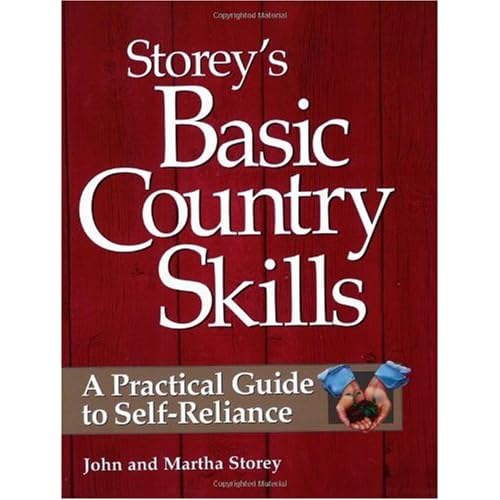 I received a great book for Christmas this year: Storey's Basic Country Skills: A Practical Guide to Self Reliance by John and Martha Story. As I read some of it, several ideas that have been swirling about in my mind emerged.
I am coming to understand that homesteading is not easy. It is rewarding, but not easy. It takes time, energy, and money (at least at first). I am at somewhat of a crossroads in life where I can decide how much more to put into homesteading. I am beginning to think I should go ahead and put more into it. Here is a list of reasons why:
I received a great book for Christmas this year: Storey's Basic Country Skills: A Practical Guide to Self Reliance by John and Martha Story. As I read some of it, several ideas that have been swirling about in my mind emerged.
I am coming to understand that homesteading is not easy. It is rewarding, but not easy. It takes time, energy, and money (at least at first). I am at somewhat of a crossroads in life where I can decide how much more to put into homesteading. I am beginning to think I should go ahead and put more into it. Here is a list of reasons why:
- We can grow food that is good for us: fresh (at its height of nutrition), organic, and whole.
- We can be producers instead of consumers. This is more than something you do; it is an attitude. God calls us to work and produce. We can see in our culture what happens to people who primarily consume and rarely produce. It allows people to see a certain standard of living as a right. Often it produces laziness, self-centeredness, and dependence on the system.
- We can learn to build things and solve problems and learn skills for life. All of these things contribute to a broader, sharper mind and spill initiative and confidence over into other areas of life.
- We can be more self-reliant . . . in a good way. Not independent from God or community, but from “the system.” From industrialization that focuses on mass production of unhealthy goods, from government, and from an economy highly dependent upon oil, gas, and transportation. In addition, the US economy is not stable right now. The vast amount of debt and the ridiculous solution of printing more paper money only ensure some type of economic crisis. Self-reliance may come in handy.
- We can pass on homesteading skills to our children and grandchildren. “If I figured out the cost per jar in our pantry, that wouldn’t be impressive . . . . But none of that is important . . . to develop and pass along some country skills to children and grandchildren, makes it all worthwhile" (Storey's, xi).
- We can integrate our children’s education into homesteading. I have already written about how important it is to allow education to take place in a real life environment as opposed to primarily a fabricated classroom/textbook type setting. All the work, problem solving, creativity, discipline, and business required for a homestead provide a wonderful learning environment.

 I was notified last weekend that my workshop proposals were accepted and I will be speaking (for the first time) at this year's North Carolinians for Home Education Conference. I'm not yet sure which one(s) were selected or when they will be scheduled. Here are the descriptions:
I was notified last weekend that my workshop proposals were accepted and I will be speaking (for the first time) at this year's North Carolinians for Home Education Conference. I'm not yet sure which one(s) were selected or when they will be scheduled. Here are the descriptions:

